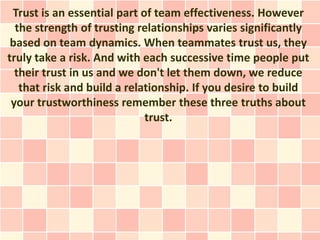
Building Trust on Your Team
- 1. Trust is an essential part of team effectiveness. However the strength of trusting relationships varies significantly based on team dynamics. When teammates trust us, they truly take a risk. And with each successive time people put their trust in us and we don't let them down, we reduce that risk and build a relationship. If you desire to build your trustworthiness remember these three truths about trust.
- 2. 1. Trust begins with yourself "A man who doesn't trust himself can never truly trust anyone else" - Cardinal de Retz. You are not capable of honesty with others if you are not honest with yourself. Any self-deception is the enemy of team trust. You must admit your shortcomings to yourself, before you can improve them. The first step in building trust on your team is to take a good look at yourself. Are you honest with yourself about how you live your life? If you say "yes" does that mean yes unequivocally? Do you consistently follow through with your commitments? You cannot ask teammates to put their confidence in you if you have a history of letting others down. Work on your character first, then your relationships.
- 3. 2. Trust cannot be compartmentalized "Relativity applies to physics, not ethics" - Albert Einstein. I believe many people today try to compartmentalize their lives. They believe they can cut corners or compromise their values in one area of life and it won't affect another area. But character doesn't work that way. And neither does trust. You can't have one set of ethics for your business life and another for your personal life. Trust won't work that way. If someone asks you to help him in a lie, don't believe he will avoid lying to you whenever it's convenient. What a person will do with you, he'll also do to you. An individual's character eventually bleeds into every aspect of his life.
- 4. 3. Trust works like a bank account "In a networked world, trust is the most important currency" - Eric Schmidt. Trust in teams is like a bank account among the teammates. You have to keep making relationship "deposits" if you want team trust to grow. On occasion, things will go wrong, and you will have to make a "withdrawal." When some one new joins your team you start fresh with that person. Their team bank account has a zero balance. If the person is initially trusting and generous, you may begin with a small balance. If he is suspicious or hurting, you begin with a deficit. Each time you do something to build trust, you put a deposit into the team account. Each time you do something negative, you make a withdrawal. Do enough negative things - due to lack of character or competence - and your account team becomes bankrupt.
- 5. This dynamic works in every area of your life. Trust is the currency of relationships. Constant withdrawals will bankrupt your team relationships; cause you to lose your job, and your friends. If this is a new concept to you, then you need to ask yourself some questions at the end of each day:
- 6. Am I making deposits? Think about your most important relationships. Are you exhibiting trustworthy behavior that's putting relational money in the bank?
- 7. Am I making withdrawals? Have you undermined trust in any of those important relationships? If so, you need to try to make things right. Don't wait another minute to take the appropriate action by doing the following:
- 9. b. Ask yourself why you broke trust.
- 10. c. Correct the issue in your life.
- 11. d. Recognize that it takes longer to restore trust than to lose it.
- 12. a. Remember, trust is restored by deeds, not words.
- 13. Am I compounding my trust? Once you create an account of trust it becomes tradition. Existing team members will establish your credibility with new comers. You can develop so much trust that it actually builds without additional deposits. But it takes time and consistency.
- 14. Take the plunge. I'm not saying you will never get hurt. You might. But I can say this: you'll never experience the joy that comes only from relationships unless you're willing to make building trust with others a priority. Martin Luther King said, "The time is always right to do what is right."